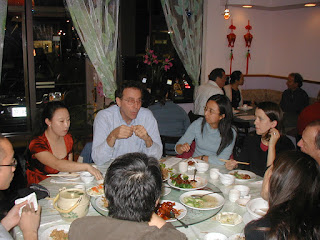I returned to MIT in the Spring of 2005 to assist several PdD students and a PostDoc. I was on campus about 2 days a week and we conducted research, field trips, and some entrepreneurial investigations. I remained there until 2012 when some VP of Administration who I never knew took a disliking to me for reasons unknown. But that is another story. But weekly I would have dinners with my students and a colleague who would add some insight from their successful careers. One was Ed Habib, a phenomenal engineer and visionary, having been in WW II Navy and having been the architect and implementer of many key NASA satellites.
A second one of our "guests" was Dr David Margulies, a physician and entrepreneur, showing my students that research and professional excellence can excel in the commercial world as well. These dinners were a means to expand their worlds, rather than just the ofttimes closed MIT environment. Namely, human contact and communications was critical.
Then in 2005, some of my students had discovered Facebook from Harvard. It was just then migrating to MIT. They insisted I join in. So I did. The BBC now recounts the 20th anniversary of Facebook, and it is worth the read. They note:
Other social networks, such as MySpace, existed before Facebook - but Mark Zuckerberg's site instantly took off when it launched in 2004, proving just how rapidly an online site of this kind could take hold.In less than a year it had one million users, and within four years it had overtaken MySpace - fuelled by innovations such as the ability to "tag" people in photos.Taking a digital camera on a night out, then tagging your friends in dozens of pictures was a staple of teenage life in the late noughties. The constantly changing activity feed was also a big draw for early users.By 2012, Facebook had surpassed one billion users a month and, aside from a brief blip at the end of 2021 - when daily active users dropped for the first time - the platform has continued to grow.By expanding into less connected countries and offering free internet, the company has maintained and increased the number of Facebook users. At the end of 2023, Facebook reported it had 2.11 billion daily users.Admittedly, Facebook is less popular than it used to be with young people. Nonetheless, it remains the most popular social network in the world, and has ushered in a new era of social activity online.
Now after just a few weeks of use of Facebook, I realized that Facebook was a fantastic psychological profiling system. Back in the 60s we always were trying to profile Soviet targets. It was generally done at a distance. Now with Facebook, one could get a fantastic psy-profile.
Yet after a few weeks it became clear that not only did they get a profile they could use that to influence the user. Perfect PsyOps! I told my students but to no avail, it had become an addiction. Now with an abundance of these tools, foreign adversaries view their own platforms can influence the mentally vulnerable, also known as most under 35!
Free Speech is a cornerstone of our Democracy, but PsyOps controlled by an adversary is not.





